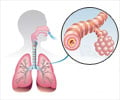Whether a child will develop allergies or wheezing is closely related to how he or she grew at vital stages in the womb, says a new study.

A fetus that grows too slowly in the womb is also more likely to become an infant who wheezes with common colds, possibly as a result of narrower airways in its lungs.
"We already know that a baby's growth in the womb has an important influence on susceptibility to obesity and heart disease in later life, but this research provides some of the most direct evidence yet that changes in how the baby's immune system and lungs develops before birth can predispose them to some of the commonest childhood illnesses," said Keith Godfrey, Professor of Epidemiology and Human Development at the University of Southampton.
The researchers studied more than 1,500 three year-old children.
The team discovered evidence of sensitivity to common allergens (atopy) in 27 per cent of children who had developed quickly in early pregnancy but faltered later in pregnancy, as compared with 4 per cent in those with a slow early growth trajectory and quicker growth in late pregnancy.
Stephen Holgate, from the Medical Research Council, said, "Unraveling the complex interplay between immunity and disease, over the course of a person's life, including before they are even born, is a core part of the MRC's research strategy. Furthering our understanding of the body's natural resilience is critical to developing new advances in the treatment of infectious diseases, autoimmune diseases and allergies."
Advertisement
Source-ANI














